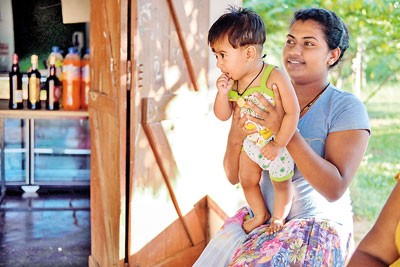Sunday Times 2
Reproductive rights are often treated as a political bargaining chip; this must stop
This year marks fifty years since the United Nations Population Fund (UNFPA) was established, globally. Fifty years ago, the world was a different place. It was difficult for women to have the choice on when to complete their education, when to plan a career, or when to start a family. Women found it difficult to exercise their reproductive rights on whether, when, and how many children to have. Many women died during pregnancy and while giving birth. Today, we have come a long way. Globally, huge advancements have been made over the last fifty years, particularly in terms of maternal health and family planning.

Ritsu Nacken
A paradigm shift
The midpoint during the UNFPA’s fifty-year journey was a critical moment in history. In 1994, 25 years ago, 179 nations, including Sri Lanka, came together in Cairo for the International Conference on Population and Development (ICPD). This was a landmark conference since it recognised that sexual and reproductive health and women’s empowerment are intertwined, and that both are necessary for development.
The ICPD also adopted a revolutionary Programme of Action that called for women’s reproductive health and rights to take centre stage in national and global development efforts. The gains made since the ICPD are remarkable.
Celebrating the achievements
As a result, today, worldwide, fewer women die during pregnancy and childbirth, and more young people are able to access sexual and reproductive health information and services. LGBTQI rights are more recognised than ever before, and women’s reproductive rights and choices are increasingly being considered in national planning and policies. In 1994, only 15% of married women in the least developed countries used a modern contraceptive. Today, 37% do. Twenty-five years ago, in the least developed countries, nearly 8 in 1,000 women died during pregnancy or childbirth. Today, the rate has been cut in half.
In 1973, UNFPA established its presence in Sri Lanka, four years after it was set up. Globally, Sri Lanka is commended for its advancements and progress in maternal health. The first maternity hospital in Sri Lanka, De Soysa Maternity Hospital, was established in 1879, as the second maternity hospital ever to be opened in Asia. The wealth and knowledge that unfolded over the next 140 years, has resulted in Sri Lanka having the best maternal health indicators in South Asia.
Today, almost every mother in Sri Lanka delivers her child in a health facility by a skilled professional, and 99 percent of mothers receive antenatal and postnatal care. These remarkable achievements must be celebrated and we commend Sri Lanka’s governments for the continuous investments in maternal healthcare. However, while tremendous advancements have been made, many challenges still exist in ensuring universal access to sexual and reproductive health and reproductive rights.

Every woman should have the choice to decide whether to have children, and, if so, when and how many
Reproductive rights
While much progress has been made globally and locally, women’s rights, particularly reproductive rights, are at risk. We see that reproductive rights are often treated as a political bargaining chip in many countries, and women suffer the repercussions. This must stop.
We live in a Sri Lanka today where maternal mortality has been stagnant during the past 10 years, at around 30 maternal deaths per 100,000 live births. Now, maternal mortality is on a rise. The latest data from the Family Health Bureau indicates 39.3 maternal deaths per 100,000 live births. This means that more mothers are dying while pregnant or giving birth. Wide regional disparities exist, highlighting the urgent need to reach those furthest behind.
We live in a Sri Lanka today where communal violence is triggered through inaccurate information relating to family planning and contraception. Family planning is a human right, and it saves mothers’ lives. Misunderstandings and misinformation relating to family planning cannot be accepted in 21st Century Sri Lanka, especially with the country boasting an impressive literacy rate of over 95 percent.
We live in a Sri Lanka today where more than 50 percent of youth are unaware of the reproductive system of the opposite sex. Comprehensive sexuality education must be fully implemented in schools and universities, as well as out-of-school settings, to provide age-appropriate education to young people about their bodies and choices. Young people must be equipped with this crucial knowledge to be able to make informed choices about life-changing decisions.
We live in a Sri Lanka today where 90 percent of women have experienced sexual harassment in public buses and trains at least once in their lifetime. Response and prevention of sexual gender-based violence must be strengthened more comprehensively to ensure that every woman and girl can live in a safer environment, free from prejudice, violence, and inequity – may it be at home, in the workplace, on public transport, or at school or university.
A better tomorrow
This is the Sri Lanka we live in today, but this cannot be the Sri Lanka we live in tomorrow. That is why the UNFPA, as the UN’s sexual and reproductive health agency, strives to make a difference. As we mark 50 years since our establishment globally, we renew our commitment to the people of Sri Lanka, by supporting the Government to accelerate the promise of the ICPD, and in achieving the triple zeros — zero preventable maternal deaths, zero unmet need for family planning, and zero incidence of gender-based violence and harmful practices against women and girls.
We will continue to end the invisibility of those left furthest behind, and we will ensure that every woman — and girl — is able to exercise her rights so she can prosper as equal partners in sustainable development and peace and reconciliation efforts.
This is an unfinished agenda, and every one of us plays a role in accelerating the promise.
Let’s start now. If not now, then when?
(The writer is the United Nations Population Fund (UNFPA) Representative in Sri Lanka)

